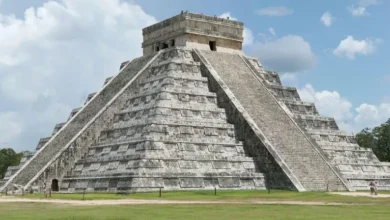How Food Helps Us Reset, Reflect, and Renew
Discover how fasting, feasting, and special food rules play a powerful role in spiritual traditions around the world — helping people cleanse, connect, and start fresh.
Why Do People Fast — or Feast — for Spiritual Reasons?
Have you ever skipped a meal to “reset” your body? Or eaten something special to celebrate a holiday?
You’re not alone.
For thousands of years, people around the world have used food — and the choice to not eat it — as a way to grow spiritually, heal emotionally, or mark a fresh start.
See also Globalization and Fusion: How Modern Influences Reshape Traditional Food Rituals
Globalization and Fusion: How Modern Influences Reshape Traditional Food RitualsWhether it’s giving up sweets for Lent, eating dates to break the Ramadan fast, or sharing a feast to honor ancestors — food is more than fuel. It’s a language. A ritual. A way to say: I’m changing. I’m honoring. I’m becoming.
Let’s explore how different cultures use food to purify, reflect, and renew — from solemn fasts to joyful feasts.
Fasting: Not Just Skipping Meals — It’s About Focus

Fasting doesn’t mean “starving.” In spiritual traditions, it’s about clearing space — in your body and your mind — so you can focus on what matters most.
🌙 In Islam: Ramadan
Muslims fast from sunrise to sunset for a whole month. No food. No water. No distractions.
See also Food as Offering: Honoring Ancestors and Deities Through Ritual Meals
Food as Offering: Honoring Ancestors and Deities Through Ritual MealsWhy? To build patience, gratitude, and closeness to God. At sunset, families gather to break the fast together — often starting with dates and water, just as the Prophet Muhammad did.
💬 “It’s not about hunger. It’s about heart.” — Common saying during Ramadan
✝️ In Christianity: Lent
Before Easter, many Christians give up something they love — chocolate, social media, meat — for 40 days. It’s a way to remember Jesus’ time in the desert and prepare their hearts for Easter.
Some go further — fasting on Ash Wednesday and Good Friday — to feel a deeper sense of sacrifice and renewal.
🕍 In Judaism: Yom Kippur
The holiest day in the Jewish calendar is also a 25-hour fast. No food. No water. No work.
It’s a day to reflect, apologize, and ask for forgiveness — from God and from others. The fast ends with a joyful meal shared with family and friends.
Food Rules: More Than “Do’s and Don’ts” — They’re About Meaning
Many religions have special food rules. These aren’t random — they help people stay connected to their values, their history, and their community.
🥩 Kosher (Judaism) & Halal (Islam)
- Kosher: Only certain animals, prepared in specific ways.
- Halal: Meat blessed in God’s name, no pork or alcohol.
These rules aren’t just about health — they’re about living with intention, respect, and mindfulness.
🌿 Vegetarian Diets in Hinduism & Jainism
In Hinduism, many avoid beef — the cow is sacred.
In Jainism, some won’t even eat root vegetables — to avoid harming tiny creatures in the soil.
It’s not picky eating. It’s deep respect for all life.
Feasting: Celebrating with Purpose

Sometimes, you have to feast before you fast — or feast to honor those who’ve passed.
🎭 Carnival & Mardi Gras
Before the quiet of Lent, many cultures throw a big party — parades, music, dancing, and lots of rich food. Think: king cake, beignets, fried treats.
It’s not just fun — it’s a way to use up rich foods before the fasting season begins — and to celebrate life before turning inward.
💀 Día de los Muertos (Mexico)
Families build colorful altars with photos, candles, marigolds — and the favorite foods of loved ones who’ve passed away. Pan de muerto (sweet bread), sugar skulls, tamales, even bottles of soda or tequila.
They believe the spirits return to enjoy the scent and essence of the food. It’s not sad — it’s a joyful reunion.
Cleansing Through Food: Resetting Body and Spirit
Some traditions use specific foods to “cleanse” — not just the body, but the soul.
🍚 Ayurveda (India)
In Ayurvedic tradition, people sometimes eat only simple meals — like rice and lentils — to reset their digestion and calm their minds. It’s called a “kitchari cleanse.”
Think of it like hitting the “refresh” button — for your body and your mood.
🌾 Native American Traditions
In some tribes, people enter a sweat lodge — a kind of spiritual sauna — and follow it with simple foods like corn, berries, or herbal teas. It’s a way to wash away stress, grief, or bad energy — inside and out.
Why Does This Still Matter Today?
Even if you’re not religious, you might relate:
- Giving up sugar to “reset” your health
- Eating mindfully to feel more present
- Sharing a meal to reconnect with family
Modern “wellness” trends — juice cleanses, intermittent fasting, “clean eating” — often echo ancient spiritual practices. We still crave meaning, pause, and purpose in how we eat.
The difference? Ancient traditions tie food to community, story, and spirit — not just calories or carbs.
Real-Life Examples Around the World
| Ramadan (Islam) | Fast during daylight, feast at night | Builds patience, gratitude, and community |
| Lent (Christianity) | Give up a favorite food or habit | Prepares the heart for renewal at Easter |
| Yom Kippur (Judaism) | 25-hour fast + prayer | Cleanses the soul, seeks forgiveness |
| Día de los Muertos (Mexico) | Build altars with favorite foods of the dead | Honors ancestors, celebrates life after death |
| Navratri (Hinduism) | Eat only certain grains, fruits, or fasting foods for 9 days | Purifies body and mind to honor the goddess |

FAQs: Food, Fasting, and Spirituality
❓ Why do so many religions use fasting?
Fasting helps people slow down, focus inward, and reconnect with what’s sacred — whether that’s God, nature, family, or their own values.
❓ Is fasting healthy?
For most healthy people, short spiritual fasts are safe — but always check with a doctor. The goal isn’t weight loss — it’s reflection and renewal.
❓ Can I try a spiritual fast even if I’m not religious?
Absolutely. Many people fast to reset their habits, practice self-control, or simply pause in a busy world. You set the intention.
❓ What’s the difference between a diet and a spiritual fast?
A diet is often about changing your body. A spiritual fast is about changing your heart, mind, or connection to something bigger.
Conclusion: Food Is Never Just Food
Whether you’re fasting to focus, feasting to remember, or following food rules to stay true to your values — you’re taking part in a tradition as old as humanity.
Food helps us mark time.
It helps us heal.
It helps us belong.
So next time you sit down to eat — or choose not to — ask yourself:
What am I honoring?
What am I releasing?
What am I becoming?
Because in every bite — and in every fast — there’s a story. A ritual. A chance to begin again.




